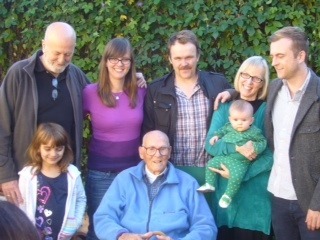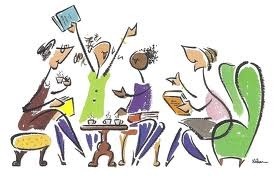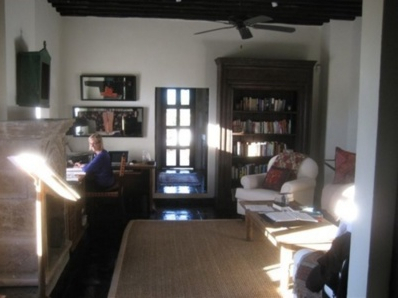Sandra Gulland's Blog, page 20
November 30, 2013
Moo + Photofunia = how a deadline-crazed historical novelist can wile/while away a few hours
One of the tasks associated with having a new book coming out is updating the contact cards one gives out to readers. (A book begins and ends with stationary.)
This time I decided to go with Moo cards. What’s special about Moo is that you can have a different image on the back of every card.
Here you see one card and a few of the images on the back, plus the Moo mini-cards (which I adore).

Amazing! It’s very reasonable and the quality is high.
I created the faux images using THE SHADOW QUEEN and other books covers and the free Photofunia app. Below are three of the seventeen images I used. (I posted all of them to Flickr—should you wish to see what Photofunia can do.)
Needless to say, I got carried away. Photofunia is so much … well: fun.



And, on a final note, I had to go to Grammarist.com to see if I should wile away a few hours, or while them away. What’s your guess?
It turns out that “while” is historically correct, but that “wile,” although technically incorrect, is the more common usage now and has been accepted. See the explanation here.
(Don’t you love how you can ask the Net anything?)
November 28, 2013
Heartfelt teary memories of our California Thanksgiving last year …
A year ago, my California family had a big Thanksgiving: my dad and all his progeny were there. Richard and I flew up from San Miguel de Allende, Mexico. Our daughter and her family flew in from Toronto, and our son flew in from New York.

It was a huge gathering: four generations! You can imagine how wonderful it was.
Dad, soon to turn 95, was always chipper but increasingly frail. Even so, it came a shock when he died a little over two months later.
I’m so grateful that we had this family gathering.
Here’s a beautiful poem my friend Jenifer McVaugh sent me this morning: “Thanks,” by W. S. Merwin:
Listen
with the night falling we are saying thank you
we are stopping on the bridges to bow from the railings
we are running out of the glass rooms
with our mouths full of food to look at the sky
and say thank you
we are standing by the water thanking it
smiling by the windows looking out
in our directions
back from a series of hospitals back from a mugging
after funerals we are saying thank you
after the news of the dead
whether or not we knew them we are saying thank you
over telephones we are saying thank you
in doorways and in the backs of cars and in elevators
remembering wars and the police at the door
and the beatings on stairs we are saying thank you
in the banks we are saying thank you
in the faces of the officials and the rich
and of all who will never change
we go on saying thank you thank you
with the animals dying around us
our lost feelings we are saying thank you
with the forests falling faster than the minutes
of our lives we are saying thank you
with the words going out like cells of a brain
with the cities growing over us
we are saying thank you faster and faster
with nobody listening we are saying thank you
we are saying thank you and waving
dark though it is
I have a lot to be grateful for, and one gratitude at the core of my being is that I have the very good fortune to be a writer … and with that, hand-in-hand, is my heartfelt gratitude for readers. I thank you so much.
November 16, 2013
The “Why” of Skype meets with book clubs

Yesterday afternoon I told my husband I was thinking of giving up Skype meets with book clubs. So many times, the connection has been terrible. I had a Skype meet scheduled that night, and I felt uneasy, expecting the worst.
Then of course, when I opened my Skype application, it crashed. And then again. And then again.
This did not bode well!
Very last minute, I had to download the application anew. But lo and behold, once launched, my connection with the book club in Hamilton, Ontario, was absolutely perfect.

But more importantly, this was a dynamite club, and we had a wonderful talk. I came away uplifted. No way am I going to give up book club meets!

The life of a writer is solitary, and contact with readers is hugely sustaining. I wish I knew your name, Hamilton book club—for if I did, I would sing your praise here. Thank you.
November 15, 2013
Yay, Romania—the first country to translate THE SHADOW QUEEN! (Who would have guessed?)

I’m so pleased. I’ve just printed out the contract for Romanian rights to THE SHADOW QUEEN. I’ll sign and send them off today.
Romania is a country I’ve not yet been published in. Here’s the list so far:
Canada (two publishers: both English and Quebec French editions)
US
UK
Germany
France
Italy
Spain (two publishers: both Spanish and Catalan editions)
Portugal
Denmark
The Czech Republic
Serbia
Hungary
Israel
Russia
Turkey
Poland
Romania
When I started writing decades ago, I assumed I would never be published, so this does make me smile.

November 5, 2013
What one does when sick: Maeve Binchy to the rescue
I pride myself on never getting sick, but I’m sick now with a nasty cold. After a lovely bowl of chicken soup my husband Richard made (
Long ago, my daughter Carrie and I went to a Maeve Binchy talk at the International Festival of Authors in Toronto. The enormous theatre was packed, people sitting on the stairs. She was enchanting!
Later, I listened to an audio version of one of her novels while I was undergoing rather strenuous dental surgery, and I went though it like a breeze. Needless to say, I’m a Maeve Binchy fan.
Here are two Maave Binchy YouTube videos on writing I discovered tonight, and I found them both delightful.
Enjoy!
November 4, 2013
Apologies (and a brief explanation)
My apologies to the subscribers to this blog for the mysterious “sss” “sss” “sss” blog post you were sent recently.
I make most of the changes to my website myself, and in this case I rather messed up!

But some things have changed, and for the better. Note that now ”Blogs” is a tab. It’s no longer, as my son pointed out, “a treasure hunt” to find my blogs. Yay!
There are, nonetheless, still quite a few glitches to be fixed. As well, in the months ahead—in anticipation of the April 8 launch of THE SHADOW QUEEN—some design changes to be made. These I will wisely put in the hands of professionals.
I adore fiddling with my website, but it’s keeping me from what I should be doing this morning: editing YA1 (shorthand for what I’m now calling HORTENSE: THE GAME OF HOPE).

And so, to work…
October 25, 2013
Last day in the bunker; looking forward, looking back, looking side-ways
Today is my last day in “the bunker”—my lovely basement office in our Ontario home. I have another lovely office awaiting in Mexico, but this one is my favourite, and I always feel a little sad leaving.

It’s said that “home is where your books are,” and that makes this place home: we’ve books everywhere here.
As soon as I finish this post, I will close the door on this office until next spring. I’ve tidied it well this year.
On the 1st of November, a little jet-lagged and travel weary, I will unpack my lovely office in San Miguel de Allende, Mexico.

As soon as I have my printer up and running, I will print out THE GAME OF HOPE (working title of The Next Novel). I’ve been thinking about it a lot and am ready to plunge into the next draft.

Other things going on:
I’ve enrolled in Witches, Plagues, and War, a free on-line course in Historical Fiction, offered through amazing Coursera.org. There are over 15,000 enrolled worldwide. Mind-boggling.
But the main thing is the quality: the course is fantastic. I’m learning and loving it.
Check out all the other Coursera offerings: are they not amazing? I want to drop out and go to school! I want to work toward that long-ago impossible dream of getting a PhD in Comparative Lit!
Maybe when I’m 80 …
October 16, 2013
Ian Mortimer and Hilary Mantel on historical fiction: a cure for complacency, fizzing on the page, and inviting characters to have a seat

I’ve enrolled in “Plagues, Witches, and War”—a free on-line Coursera class on historical fiction. It’s awesome! I’m busy right now preparing for our move south, but I always have time for reading. You can see the course reading list here.
I read two of the “core” articles yesterday, both of them excellent, ones I would recommend to anyone interested in historical fiction.
Here’s from the excellent article by Ian Mortimer (who is both an academic, and writer of historical fiction under the name James Forrester), on “Why Historians should Write Fiction“:
“It teaches you how little you really know about the minutiae of the past, and destroys professional complacency. It humbles even the most experienced researcher. It demands that you think deeply about human character, and how it is formed, and how people integrate. But most of all it shows you that there is a different sort of truth beyond the measurements of facts and dates: truths about human nature which are timeless, or, at least, very slow-moving. And it leaves you thinking that these truths, although they are unproveable, are probably the most important historical conclusions of all, for they reflect what we are, and what we can be, both as individuals and as a society.”

The other article is a New Yorker profile of Hilary Mantel: “The Dead are Real.” It moved me profoundly.
Mantel on character development
Right now, between drafts, I’m often simply thinking and making notes about Hortense and her world, exploring character. A technique Mantel sometimes uses for getting to know her characters interests me:
“When she’s starting a new book, she needs to feel her way inside the characters, to know what it’s like to be them. There is a trick she uses sometimes, which another writer taught her. Sit quietly and withdraw your attention from the room you’re in until you’re focussed inside your mind. Imagine a chair and invite your character to come and sit in it; once he is comfortable, you may ask him questions.”
(A technique which dovetails nicely with another “course” I’m taking, on learning to meditate.)
Mantel on making changes to the historical record
The following passage reverberated for me especially because I recently had to sort out quite a tangle in THE SHADOW QUEEN because I had tightened the narrative timeline for dramatic purposes.
“She couldn’t always be sure that a character was in the place she said he was in at the time she put him there, but she spent endless hours making sure that he wasn’t definitely somewhere else. “Once you play around with history, it trips a whole load of consequences,” she says.”

Mantel on a certain type of writer’s block
This passage expresses a fear I often have, and most writer have as well:
“I don’t think one ever quite learns to trust the process,” she says. “I feel, What if I wake up tomorrow and I can’t do it anymore? I know I’ll always be able to write, in the sense of having a robust style that’s sufficient to the occasion, and I know that books can be got onto the page by craft, but the thing that makes a phrase that fizzes on the paper—you always fear that may not be there any longer, because, after all, you did nothing to deserve it. You did nothing to contrive it. It’s just there. You don’t understand it, it’s out of your control, and it could desert you.”
Fortunately, I’m not a writer of phrases that fizz, but there is a certain passion and energy that one brings to a story and I do worry about fatigue. The cure for that, for me, is invariably research and inspiring reading. I’ve chosen to read A Tale of Two Cities by Charles Dickens for the class: such a passionate writer!
October 14, 2013
On happy Thanksgiving, plagues, witches, and war
Today is Thanksgiving in Canada. It’s not on a day (as in the US), but on the Monday of a long weekend. Because people often have to travel that Monday to be back at work on Tuesday, people most often meet and eat at other times. It’s really a Thanksgiving weekend!
We had 22 for (sit-down!) dinner last night, plus 1-year-old Kiki. It’s an annual event, bringing together our extended community family: our friends and their kids and the kids’ kids. It’s my favourite festivity of the year and last night was one of the best. May you all be so lucky!

I took this photo of our driveway a few weeks ago, when the tress were at their glory. Now the forest is in transition from golden to grey: I love it when the ground is covered with bright leaves and the contours of the hills become slowly visible.

On writerly news, tomorrow I start an on-line class on historical fiction: Plagues, Witches and War. It’s free, and not too late to sign up. (Click here.)
On-line classes have such wonderful potential: there are 15,000 enrolled in this one from all around the world. Imagine!
October 12, 2013
“Truth-adjacent” fiction?

I recently read a review of the iSteve movie in the July 2013 issue of MacWorld. I quote:
Despite the movie’s liberties–and it takes a lot of them–it adopts at times a surprising fidelity to historical events. In the end, you might best describe the film as “truth-adjacent.”
I like the term “truth-adjacent” and may adopt it. Another description that seems to be used in the UK but not in North America is “biographical fiction,” which describes my work exactly. “Fact-based fiction” is a term commonly used here, but I dislike it: it has a medicinal flavour.
How would you describe fiction that is based on fact?




